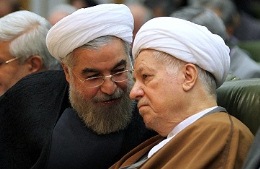 Thirty years of punishing sanctions have failed to curb�Iran�s rogue behavior. Perhaps, a growing chorus of diplomats and security experts suggest, it is time for the United States to change tactics.
Thirty years of punishing sanctions have failed to curb�Iran�s rogue behavior. Perhaps, a growing chorus of diplomats and security experts suggest, it is time for the United States to change tactics.With a presidential election in the Islamic Republic less than two months away, Iranians might be attracted to a less confrontational leader if one could hold out hope for relief from the trade and travel restrictions that have slashed food imports, gutted the currency and fostered corruption among those in high office.
At least 20 candidates have declared themselves for the June 14 contest to replace Iranian President�Mahmoud Ahmadinejad, who is barred from seeking �a third term. No radical reformers are expected to be permitted to run by the conservative Islamic clerics who vet candidates, limiting prospects for a dramatic shift in attitude among Iran's intricate hierarchy of religious and political leaders.
But arguments are gaining sway among influential foreign policymakers that proposals to further tighten sanctions on Iran for its brazen nuclear buildup will only worsen the already volatile Middle East security landscape.
U.S. Secretary of State�John F. Kerry�last week appealed to�Congress�to reject a bill that would impose more punishment on Iran for its failure to open nuclear facilities to international inspection and refrain from enriching uranium to levels that could be easily converted to bomb-making quality.
�There�s an enormous amount of jockeying going on, with the obvious normal tension between between hard-liners and people who want to make an agreement,� Kerry told the�Senate Foreign Relations Committee. �We don�t need to spin this up at this point in time.... You need to leave us the window to try to work the diplomatic channel.�
Giving diplomacy a chance is also the message of a report last week by the Iran Project, a bipartisan group of former diplomats, security officials and military brass that has spent a decade trying to identify opportunities for defrosting U.S.- Iranian relations. The 35 signators to �Strategic Options for Iran: Balancing Pressure with Diplomacy� include former national security advisor Zbigniew Brzezinski, retired U.S. Ambassador to Russia and the�United Nations�Thomas Pickering, ex-CIA�Director�Michael V. Hayden�and John Limbert, a former�State Department�officer who was among the hostages at�the U.S. Embassy�in�Tehran�in 1979-80.
�The United States should now dedicate as much energy and creativity to negotiating directly with Iran as it has to assembling a broad international coalition to pressure and isolate Iran,�� the group advises.
The�International Atomic Energy Agency�also has decided that keeping the door open with Tehran holds better prospects for resolving the standoff over nuclear site inspections than does shutting down talks for their lack of progress. Negotiators trying to gain access to military facilities where high-level enrichment and suspected bomb tests may have occurred declared their efforts at an impasse when they last met with Iranian officials in February. The Associated Press reported from Vienna last week, quoting unidentified diplomats, that a new meeting nonetheless has been set for mid-May.
Parallel talks about Iran�s nuclear developments have been conducted over the last year between Tehran and representatives of the five permanent member states of the U.N. Security Council and Germany, the so-called P5-plus-1 forum. That group met in Kazakhstan this month in a fifth futile attempt to craft an agreement on uranium enrichment. No new session has been scheduled, but negotiators have continued to cast the forum as useful.
The international community�s decisions to keep the light on for Tehran reflect the hope -- some would say wishful thinking -- that the presidential campaign could open a window for defusing tensions. Any candidate could boost his standing among voters by getting sanctions eased in exchange for cutting a deal to allow U.N. inspectors access to nuclear plants or pledging to keep uranium enrichment well below the purity level needed for weapons.
�There is some expectation that they may make some semblance of concessions abroad that they will then turn around and try to sell as a victory at home,� Abbas Milani, director of Iranian studies at Stanford University, said of Iranian politicians� campaign strategy. He describes the Tehran regime as ��profoundly fractured,� creating incentive for candidates to distance themselves from the status quo.
Milani pointed to subtle messages conveyed on the website Baztab, thought to have connections with Iranian intelligence, that if former President Mohammad Khatami were to run he would win handily over the favored candidates of�Ayatollah Ali Khamenei�and Ahmadinejad. Khatami has resisted calls to campaign for another stint as president, but he and fellow former President Ayatollah Ali Akbar Hashemi Rafsanjani are supporting the presidential bid by former nuclear negotiator Hasan Rohani, who says he wants better relations with Western countries.
Whoever emerges as president, though, could clash headlong with Khamenei, the supreme leader who is firmly in control of nuclear policy and deeply distrustful of the United States, said Najmedin Meshkati, a USC engineering professor and former State Department advisor during the first Obama administration.
Still, Meshkati said, Obama is in a unique position to take the advice of the veteran policymakers of the Iran Project and offer some sanctions relief in exchange for a deal on the nuclear issues.
�It needs to start with the president giving a mandate to very experienced and credible people like Pickering and Limbert,� said Meshkati, who also sees the addition of Kerry and Defense Secretary�Chuck Hagel�to Obama�s Cabinet as an opportunity to change the conversation. �Being a second-term president, Obama can be bold -- and he should be, if he wants to try to make resolving the Iranian issue his legacy.�
By Los Angeles Times
The Iran Project is not responsible for the content of quoted articles.










